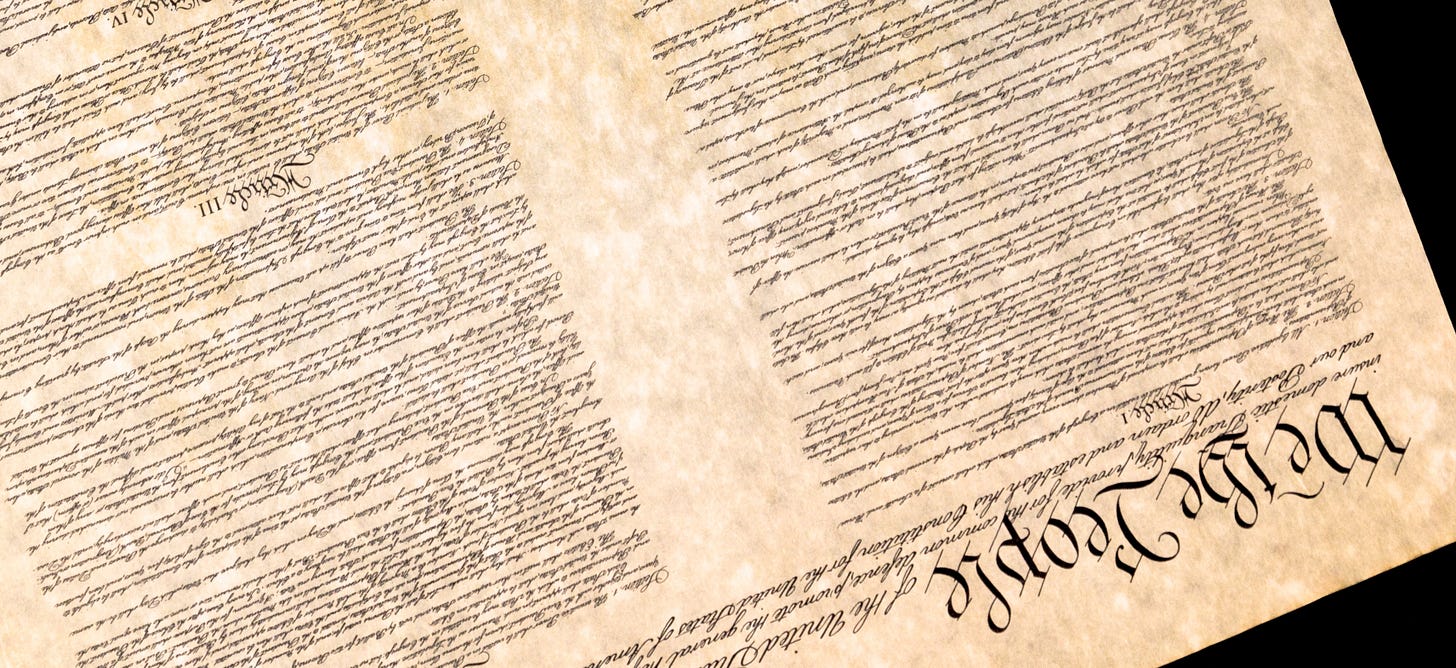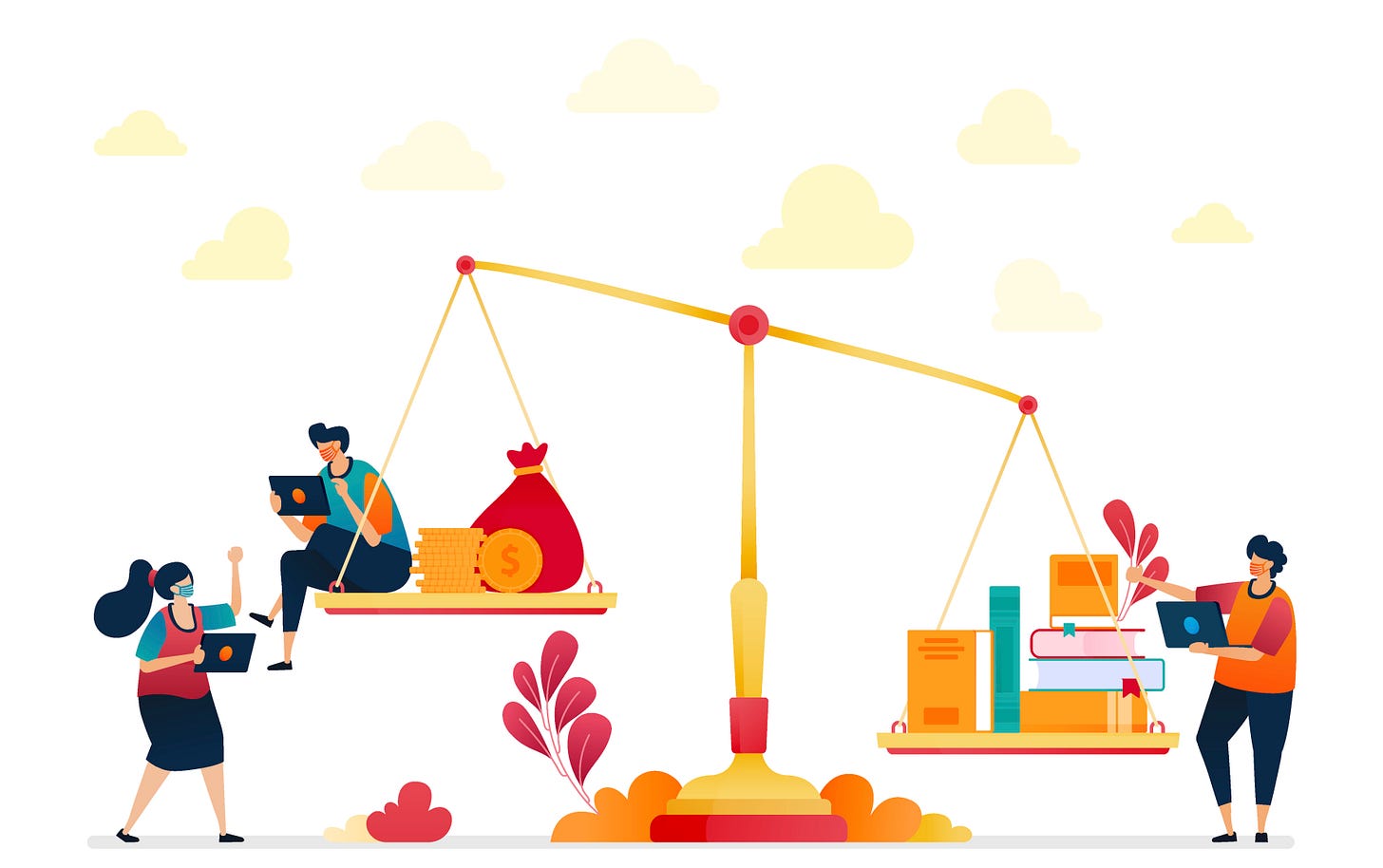E-Pluribus | June 10, 2021
Turning the Constitution upside down, the business of education is killing the classics, and the name game.
A round up of the latest and best writing and musings on the rise of illiberalism in the public discourse:
Steven Greenhut: Conservative Attacks on 'Big Tech' Are Turning the Constitution on Its Head
Part of the argument that justified Donald Trump’s rise in the Republican party was that Republicans and conservatives were being beaten because the left “played by different rules” and Trump would beat them at their own game. Steven Greenhut says some conservatives seem inclined to borrow that strategy to fight Big Tech’s ideological bias by revising the plain meaning of the Constitution.
For instance, Florida's Republican Gov. Ron DeSantis recently signed a law that applies governmental moderating standards to social-media companies. It fines tech companies if they suspend political candidates prior to elections, lets the state attorney general and even private citizens sue these companies if they believe they've been treated unfairly, and gives online publishers a list of enforceable editorial conditions.
That's obviously a government restriction on speech given that the government is mandating that private publishers behave in a certain way. Yet writing in American Spectator, the Heartland Institute's S.T. Karnick has discovered such a novel method of interpreting that law that he would have made former Justice Thurgood Marshall, the late justice who was known for his creative constitutional gyrations, quite proud.
"Defenders of Big Tech routinely argue that these companies have a right to do whatever they want because they are not government entities. That is false," Karnick wrote. "The fact that they are in the private sector does not change the definition of the word" censorship. If we erase the distinction between private censorship (which we all do) and government censorship, however, we essentially erase the First Amendment.
[…]
Yes, the media mostly treated that story as a conspiracy when Donald Trump had postulated it—but are treating it seriously now that Trump is gone. So what? Publications can print whatever they choose, some do a lousy job and all of them are biased. My conclusion is the media should learn from its mistakes, but Marcus' take is more draconian.
"Nobody is checking the fact checkers, and it is time that changed," he wrote. "It's time for government to regulate the fact checking industry." He named Politifact and Associated Press as examples of organizations that need government oversight as they advise social media—even though they are journalism organizations.
Marcus claims the First Amendment forbids regulation of "in-house" fact checkers, but he carves out the exception for independent checkers—something he appears to have pulled from thin air just like the living-and-breathing jurists. "This may seem antithetical to traditional conservative values of small government," he says, but we ought not be "slaves to orthodoxy."
Read the whole thing.
Aaron Sibarium: How Corporatization Killed Classics
“The customer is always right” is something of a capitalist mantra in the marketplace, but in an educational context it can have some perverse effects. Aaron Sibarium explains how financial and marketing pressures on colleges and universities are impacting their willingness to update centuries-old assumptions regarding how to best educate young people in the history, literature and ideas that have shaped our modern society.
These accounts aren't mutually exclusive, though, but rather two sides of the same story—one in which economic and political pressures worked in tandem to hollow out the humanities. Fields such as classics are facing a "monstrous alignment of corporate and ideological incentives" that push in the same direction, said Jacob Howland, a classicist at the University of Tulsa. Slashing requirements makes majors easier and, in certain cases, more consonant with progressive sensibilities, drawing in just enough students to keep the liberal arts afloat. It also appeases activists pushing for changes within the liberal arts, which give those fields cover to pursue their own institutional self-interest.
This nexus of incentives has been strengthened by developments in the business world. Large corporations have embraced the ideological outlook of universities, Howland noted—so, by doubling down on that outlook, universities are effectively preparing students for jobs at large corporations.
"They can mask the purely venal ethics of it," Howland added. "Wokeness and corporatism work together."
Both forces appear to have been at play in the Princeton decision. The university's classics department is home to a number of high-profile activist professors that "everyone else is afraid of," one source with knowledge of the situation said. One of them is Dan-el Padilla Peralta, who has argued that "whiteness" is so central to classics that the field may not deserve to survive.
Read it all at The Free Beacon.
Oliver Traldi: What's in a Name?
We at Pluribus have argued that a common language with clear definitions is essential for meaningful dialogue about the issues than shape and impact our society. Oliver Traldi points out that sometimes the name-game, or “game of the name” can be a distraction from dealing directly with the issues in question.
The name-game effort is sort of counterproductive for the defenders of wokeness in several ways.
First, it allows a cottage industry to prosper on the other side, too. Everyone who comes up with a new name and frame for this thing, whatever it is we’re talking about, seems to blow up. They start making money off of books, media appearances, and even donations from fanatical supporters.
Second, it pushes back any effort for a systematic explanation and evaluation of what’s going on from the woke side. What is the woke academic theory of the relationship between Kimberlé Crenshaw and Robin DiAngelo? Is one a kind of bowdlerization of the other? Are they both effects of the same cause? Or is there no relation at all? Which parts of the things anti-woke writers inveigh against are good and which are bad?
For those defenders of wokeness who agree with people like me on a lot of individual cases of this stuff, what should be done? Should we ignore them because they don’t add up to a broader phenomenon? Should we pretend they’re good so that we don’t jeopardize important related goals?
There is a bigger point to be made about language control, too. Pro-woke writers are often seen defending the idea that definitions change naturally, or even that they should be changed artificially, as social mores change, and that invidious associations should not be read into technical terms like “whiteness.” But these principles go out the window when the various names of wokeness are put on the table. The whole theory of language changes: now it’s something top-down, something that should be left to the experts, the people who have “done the reading” and can lecture about it.
Read it all here.
Around Twitter
A victory for liberal values in Great Britain:
Another item from across the sea, this on “micro aggression” reporting software used by British universities:
The Foundation for Individual Rights in Education on Cornell’s “mandatory faculty diversity, equity, & inclusion statements”:
A helpful social justice parlance interpreter from Peter Boghossian:
Bari Weiss debuts her podcast with the incredible story of Palestinian immigrant Majdi Wadi:
Another day, another article on “whiteness” via Thomas Chatterton Williams:















